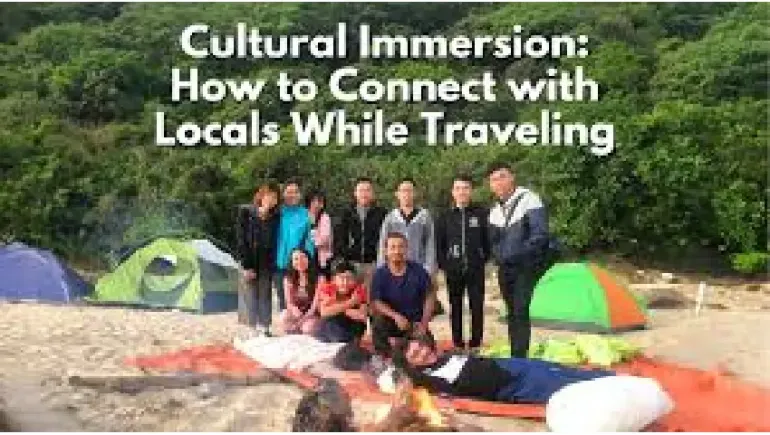
Traveling is more than just visiting new places; it is about connecting with the heart and soul of a destination. Cultural immersion allows travelers to experience the traditions, customs, and way of life of a place, creating deeper and more meaningful connections. By stepping into the shoes of locals, you can gain invaluable insights into their heritage, stories, and beliefs. Here are the best ways to embrace cultural immersion during your next adventure.
One of the most vibrant ways to experience a culture is by participating in its festivals and events. Local celebrations often showcase the essence of a community’s traditions, from music and dance to food and rituals. For instance, travelers visiting India can immerse themselves in the colors of Holi, while those in Japan may enjoy the serene beauty of cherry blossom festivals. Festivals provide a front-row seat to the unique customs of a region, making them unforgettable experiences.
Opting for homestays instead of hotels can transform your travel experience. Living with local families offers an authentic perspective on daily life, from how meals are prepared to how communities interact. Hosts are often eager to share their traditions, giving travelers a chance to learn native recipes, listen to folk stories, or even partake in customary practices. Homestays foster genuine connections and help bridge cultural gaps.
Markets are the heartbeat of any community, bustling with energy and activity. Visiting a local market is an excellent way to understand the daily life of residents. Whether it is exploring a spice market in Morocco, a floating market in Thailand, or an artisan’s market in Mexico, travelers can witness the craftsmanship, trade, and social interactions that define the region. Markets also offer an opportunity to try traditional foods and support local artisans.
Language is a powerful tool for cultural immersion. Learning a few basic phrases or greetings in the local language can significantly enhance your travel experience. It shows respect for the culture and helps you connect with locals on a deeper level. Whether you take a short language class or practice using a language app, even small efforts can make a big difference in breaking barriers.
Hands-on experiences like workshops or classes provide a direct way to engage with local traditions. Cooking classes, pottery workshops, or traditional dance lessons can offer insights into the heritage and craftsmanship of a culture. For example, travelers in Bali can learn batik painting, while those in Italy might explore pasta-making classes. These activities not only educate but also leave travelers with memorable skills and stories to share.
Understanding a culture’s past is vital to appreciating its present. Historical sites and museums offer a window into the heritage and evolution of a community. From ancient temples to interactive museums, these spaces narrate the stories that have shaped the identity of a region. A visit to the Louvre in Paris or the Pyramids of Giza, for instance, offers profound insights into the art, architecture, and beliefs of their respective cultures.
Respect is a cornerstone of cultural immersion. Before visiting a destination, you must familiarize yourself with its customs and etiquette. Simple actions, like dressing modestly in religious sites or learning about acceptable behaviors, show cultural sensitivity and openness. Respecting local traditions not only fosters goodwill but also enriches your travel experience.
Connecting directly with local communities can leave a lasting impact. Volunteering, attending community gatherings, or even sharing meals with locals are powerful ways to engage. Whether it is participating in a village’s agricultural practices or learning about indigenous storytelling traditions, these experiences provide authentic and transformative insights into a culture.
Food is an integral part of any culture, reflecting its history, geography, and values. Trying authentic dishes prepared by locals is a delicious way to immerse yourself in their world. Street food tours, cooking with a host family, or dining at local eateries can introduce you to the flavors and stories behind a region’s cuisine. For example, enjoying sushi in Japan or paella in Spain connects you with centuries of culinary tradition.
In recent years, there has been a significant shift towards slow and sustainable travel, emphasizing quality over quantity. Travelers are increasingly seeking authentic experiences, prioritizing meaningful connections over sightseeing checklists. Many destinations now offer eco-friendly programs that allow visitors to engage with local communities while supporting sustainability. For example, programs like agritourism in Italy or indigenous tours in Australia have gained popularity for their cultural depth and ethical impact.By focusing on cultural immersion, travelers can cultivate a deeper appreciation for the diversity and beauty of our world. It is about stepping out of your comfort zone, listening to the stories of others, and becoming a part of the narrative. Whether it is through festivals, food, or local connections, cultural immersion transforms ordinary travel into an extraordinary journey.



-112x63.27.webp)




-132x74.57.webp)



Comments
There are no comments for this Article.